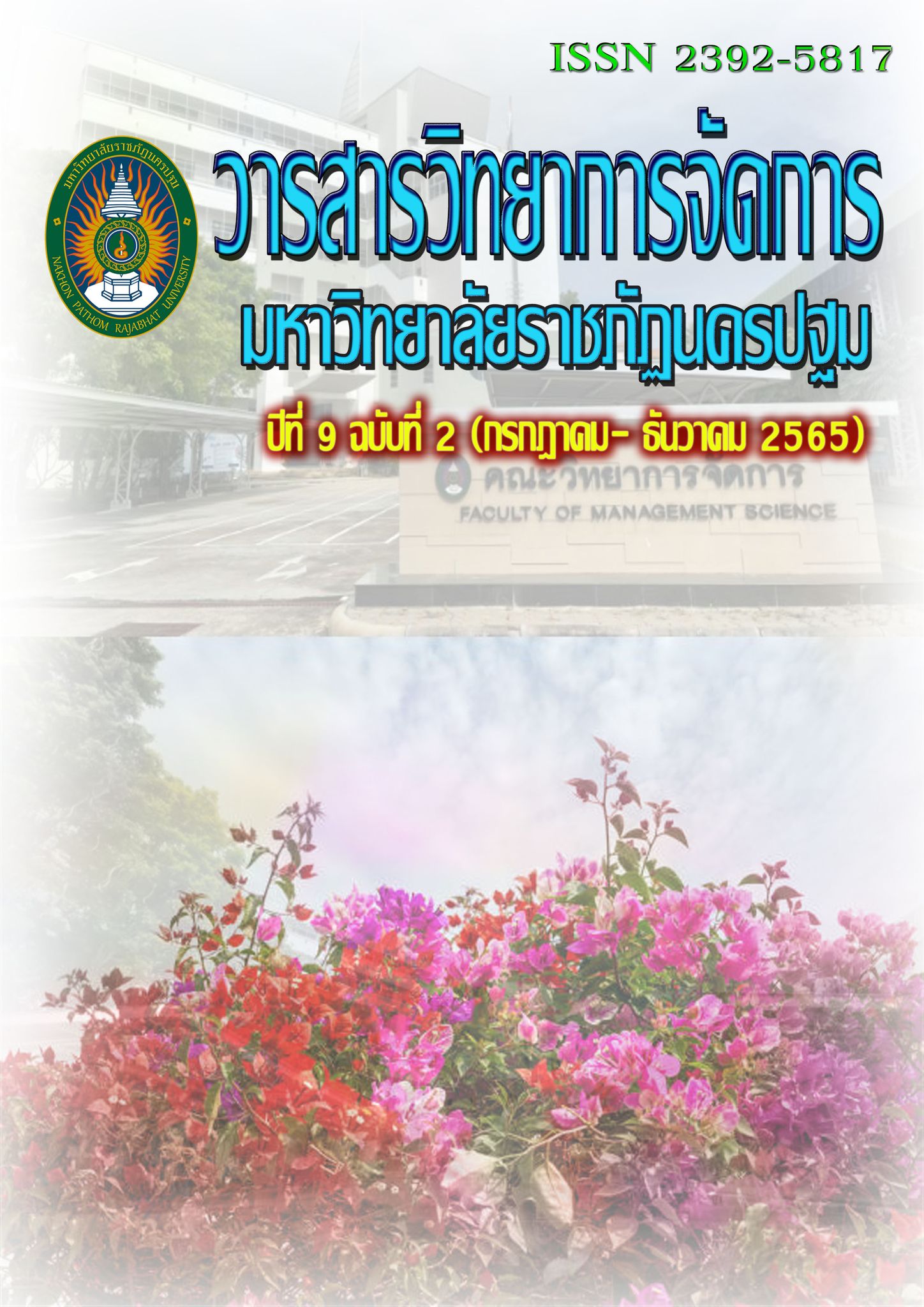The Causal Factors Influencing the Success of a Medium-Sized Restaurant Business in Bangkok
Main Article Content
Abstract
This research aims 1) to study the factors influencing the success of medium-sized restaurant businesses in Bangkok and 2) to study the causal relationship model of the factors influencing the success of medium-sized restaurant businesses in Bangkok.
A mixed research methodology was adopted to carry out this research. Regarding the quantitative method, questionnaires were used among 300 medium-sized restaurant entrepreneurs in Bangkok. For the qualitative method, in-depth interviews with a total of 30 key informants, restaurant business representatives, and representatives from Bangkok Metropolitan Administration were conducted. The data analysis to test the research hypothesis was based on structural equation analysis by AMOS program.
It was found that (1) the most influencing factor in the success of medium-sized restaurant businesses was market response followed by management processes and market focus. The effectiveness of management had no direct influence on the success of medium-sized restaurant businesses. The three factors accounted for the variance in the success of the medium-sized restaurant businesses (R2) as 0.96 (96%), and (2) the causal relationship model of the factors influencing the success of medium-sized restaurant businesses which consist of the management process, market focus, management effectiveness, and the market response was found to be consistent with the empirical data. The harmonious index of the model was as follows:
X2 = 96.85, df = 56, X2 / df = 1.73, p-value= 0.052, GFI = 0.955 และค่า RMSEA = 0.049
Article history: Received 20 March 2022
Revised 10 May 2022
Accepted 12 May 2022
SIMILARITY INDEX = 5.54 %
Article Details

This work is licensed under a Creative Commons Attribution-NonCommercial-NoDerivatives 4.0 International License.
The views and opinions of the article appearing in this journal are those of the author. It is not considered a view and responsibility of the editorial staff.
References
กรมพัฒนาธุรกิจการค้า กระทรวงพาณิชย์. (2553). การจดทะเบียนของบริษัทจำกัด. [ออนไลน์]. ค้นเมื่อ
มิถุนายน 2564. จาก www.dbd.go.th/.
กรมพัฒนาธุรกิจการค้า กระทรวงพาณิชย์. (2562). ธุรกิจร้านอาหาร. [ออนไลน์]. ค้นเมื่อ 26 มิถุนายน 2564. จาก www.dbd.go.th/.
กระทรวงการท่องเที่ยวและกีฬา. (2562). สถิติด้านการท่องเที่ยว ปี 2562. [ออนไลน์]. ค้นเมื่อ 26 มิถุนายน 2564. จาก https://webhost.mots.go.th/more_news_new.php?cid=411
กระทรวงวิทยาศาสตร์และเทคโนโลยี. (2560). ติดปีกผู้ประกอบการ กลุ่มอาหาร-เกษตร ผลักดันสู่อุตสาหกรรม 4.0. [ออนไลน์]. ค้นเมื่อ 20 กุมภาพันธ์ 2564, จาก http://www.newsplus.co.th/115877
ณัฐ อมรภิญโญ. (2556). รูปแบบการประสบความสำเร็จที่ยั่งยืนของผู้ประกอบการรายย่อยในภาคตะวันออกเฉียงเหนือตอนบนของประเทศไทย. วารสารวิชาการศรีปทุม ชลบุรี, 9(3). 57-66.
ตุลา มหาพสุธานนท์. (2554). หลักการจัดการ. กรุงเทพฯ : พีเอ็น เค แอนด์ สกายพริ้นติ้ง
นารินี อดุลทิฐิพัชร อังคณา ขันตรีจิตรานนท์ และนฤมล ศราธพันธ. (2558). ปัจจัยความสำเร็จและหลักเศรษฐกิจสร้างสรรค์ที่มีอิทธิพลต่อความสำเร็จของผู้ประกอบการร้านอาหารไทยในกรุงเทพมหานคร. วารสารเกษตรศาสตร์ (สังคม) 36, 217 – 229.
นภดล ร่มโพธิ์ และมนวิกา ผดุงสิทธิ์. (2552), เครื่องมือการประเมินผลการปฏิบัติงานองค์การ. กรุงเทพฯ : คณะบุคคลเอ็นจิเนียริ่ง.
ปวริศร์ เหลืองทองคำ. (2553). ระบบการจัดการร้านอาหาร. วิทยานิพนธ์ปริญญามหาบัณฑิต สาขาวิชาการจัดการ, บัณฑิตวิทยาลัย มหาวิทยาลัยเทคโนโลยีมหานคร.
วันทนีย์ แสนภักดี บัณฑิต ผังนิรันดร์ และปรีชา พงษ์เพ็ง. (2560). รูปแบบการดำเนินกลยุทธ์ทางการตลาดที่มีผลต่อความสำเร็จอย่างยั่งยืนของธุรกิจร้านอาหารในเขตเศรษฐกิจพิเศษ. วารสาร มจร. สังคมศาสตร์ปริทรรศน์, 6(2) (ฉบับพิเศษ). 67-82.
ศุภริน เจริญพานิช. (2562). บทวิเคราะห์ธุรกิจ SMEs (Quick Study) สาขาร้านอาหาร. กรุงเทพฯ :กรมพัฒนาธุรกิจการค้ากระทรวงพาณิชย์.
ศุภวุฒิ สายเชื้อ ปรเมธี วิมลศิริ ริชาร์ด ไพวิส ชัยประนิน วิสุทธิผล ดวงฤทธิ์ บุนนาค และ อภิสิทธิ์ ไล่สัตรูไกล. (2552). ทำไมต้องเศรษฐกิจสร้างสรรค์. กรุงเทพ ฯ: คอนแทรคท์ พับลิชิ่ง.
ศูนย์วิจัยกสิกรไทย. (2564). ร้านอาหาร ปี 64 ยังเสี่ยงสูง. [ออนไลน์]. ค้นเมื่อ 15 สิงหาคม 2564 จาก
https://kasikornresearch.com/th/analysis/k-social-media/Pages/Restaurant-FB-15-01-21.aspx
ศิริพงศ์ รักใหม่. (2552). ปัจจัยที่มีผลต่อความสำเร็จของผู้ประกอบการร้านอาหารและภัตตาคาร: กรณีศึกษาผู้ประกอบการร้านอาหารและภัตตาคารในเขตประเวศและพระโขนง กรุงเทพมหานคร. วิทยานิพนธ์ปริญญามหาบัณฑิต, บัณฑิตวิทยาลัย วิทยาลัยดุสิตธานี.
ศิริวรรณ เสรีรัตน์ ปริญ ลักษิตานนท ์ และ สมชาย หิรัญกิตติ. (2547). ศัพท์การบริหารธุรกิจ. กรุงเทพ ฯ: ธรรมสาร.
อภิรดี คําไล้. (2562). อิทธิพลกระบวนการจัดการและตัวแบบกลยุทธ์ 7’S ที่ส่งผลต่อความสำเร็จของธุรกิจ
แฟรนไชส์ในประเทศไทย. วารสารศรีปทุมชลบุรี, 16(2), 114-122.
อลงกรณ์ มีสุทธา และสุมิตร สัชฌุกร. (2551). การประเมินผลการปฏิบัติงาน การประเมินโดยใช้ Competency. (พิมพ์ครั้งที่ 14). กรุงเทพ ฯ: สมาคมส่งเสริมเทคโนโลยี (ไทย-ญี่ปุ่น).
Dessler, G. (2013). Human resource management (13th ed.). New Jersey: Prentice-Hall.
Homburg, C., Grozdanovic, M., and Klarmann, M. (2007). Responsiveness to customers and competitors: the role of affective and cognitive organizational systems. Journal of Marketing, 71(3), 18–38.
Hooper, V. A. (2006). The impact of the alignment between information systems and marketing on business performance. Retrieved January 21, 2020, from https://core.ac.uk/download/pdf/41335743.pdf
Hult, G. T. M., Snow, C. C., and Kandemir, D. (2003). The role of entrepreneurship in building cultural competitiveness in different organizational types. Journal of Management, 29(3), 401-426.
Kotler, P., & Armstrong, G. (2010). Principles of Marketing. Prentice Hall.
Leung, J., and Kleiner, B. H. (2004). Effective management in the food industry. Management Research News, 27(4/5), 72-81.
McDonald, P. (2010). Teaching the concept of management: Perspectives from six honest serving men. Journal of Management and Organization, 16(5), 626-640.
Narver, J. C., and Slater, S. F. (1990). The effect of a market orientation on business profitability. The Journal of Marketing, 54(4), 20-35.
Ninemeier and Hayes. (2012). Foundation Lodging Management. U.S.A.: Pearson.
White, J. C., Varadarajan, P. R., and Dacin, P. A. (2003). Market situation interpretation and response: the role of cognitive style, organizational culture, and information use. Journal of Marketing, 67(3), 63–79.


